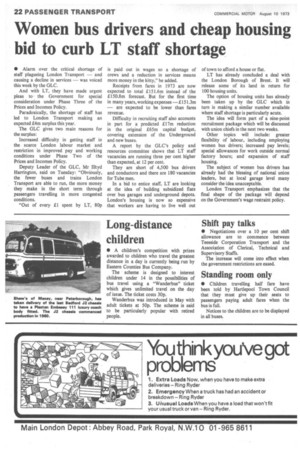Women bus drivers and cheap housing bid to curb LT staff shortage
Page 24

If you've noticed an error in this article please click here to report it so we can fix it.
• Alarm over the critical shortage of staff plagueing London Transport — and causing a decline in services — was voiced this week by the GLC.
And with LT, they have made urgent pleas to . the Government for special consideration under Phase Three of the Prices and Incomes Policy.
Paradoxically, the shortage of staff has led to London Transport making an expected £4m surplus this year.
The GLC gives two main reasons for the surplus: Increased difficulty in getting staff in the scarce London labour market and restriction in improved pay and working conditions under Phase Two of the Prices and Incomes Policy.
Deputy Leader of the GLC, Mr Illtyd Harrington, said on Tuesday: "Obviously, the fewer buses and trains London Transport are able to run, the more money they make in the short term through passengers travelling in more congested conditions.
"Out of every£1 spent by LT, 80p is paid out in wages so a shortage of crews and a reduction in services means more money in the kitty," he added.
Receipts from fares in 1973 are now expected to total £151.6m instead of the £150.8m forecast. But for the first time in many years, working expenses —£151.3m — are expected to be lower than fares revenue.
Difficulty in recruiting staff also accounts in part for a predicted £17m reduction in the original £65m capital budget, covering extension of the Underground and new buses.
A report by the GLC's policy and resources committee shows that LT staff vacancies are running three per cent higher than expected, at 12 per cent.
They are short of 4,500 bus drivers and conductors and there are 180 vacancies for Tube men.
In a bid to entice staff, LT are looking at the idea of building subsidized flats over bus garages and underground depots. London's housing is now so expensive that workers are having to live well out of town to afford a house or flat.
LT has already concluded a deal with the London Borough of Brent. It will release some of its land in return for 100 housing units.
The option of housing units has already been taken up by the GLC which in turn is making a similar number available where staff shortage is particularly acute.
The idea will form part of a nine-point recruitment package which will be discussed with union chiefs in the next two weeks.
Other topics will include: greater flexibility of labour, including employing women bus drivers; increased pay levels; special allowances for work outside normal factory hours; and expansion of staff housing.
The subject of women bus drivers has already had the blessing of national union leaders, but at local garage level many consider the idea unacceptable.
London Transport emphasizes that the final shape of the package will depend on the Government's wage restraint policy.




























































































